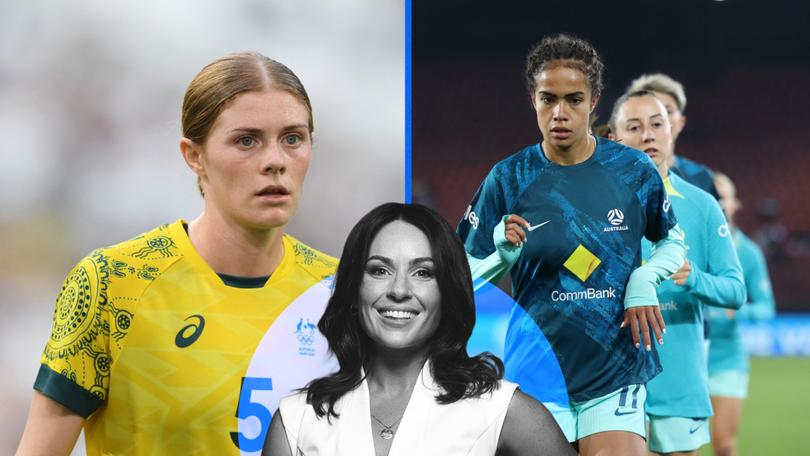GEORGIE PARKER: Cortnee Vine and Mary Fowler’s brave decisions to take Matildas break the right ones
GEORGIE PARKER: Cortnee Vine and Mary Fowler’s brave moves to take a break from the Matildas for mental health reasons shows how far female sport has come since I was battling my demons with the Hockeyroos.

Cortnee Vine, one of Australia’s most recognisable names and faces after the Women’s World Cup, has taken a break from Australia’s most recent international commitments.
She has said she needs to prioritise her mental health, and I am even more impressed with her now than I was when she nailed the penalty shot that stopped a nation against France in Brisbane last year.
Her teammate Mary Fowler announced on Sunday that she was also taking a break and would not play in the friendlies against Brazil and Taiwan in Australia over the next two weeks.
Sign up to The Nightly's newsletters.
Get the first look at the digital newspaper, curated daily stories and breaking headlines delivered to your inbox.
By continuing you agree to our Terms and Privacy Policy.In a statement from her management on behalf of Vine, she said, “I’m sure many people can appreciate that my life has dramatically changed over the past two years. Due to these very new and sometimes overwhelming experiences, I’ve discovered that identifying, managing, and prioritising my mental health has become something I have needed to work very hard on … For now, I need to focus on taking care of myself, which is why I am taking some time off.”
I can’t imagine how life changed for Vine after that penalty; from relative anonymity to being a national hero. What I can imagine, though, as someone who personally struggles with huge mental health battles, is how hard it is to prioritise yourself in a team environment like this, and the bravery it takes to be so public with it.
Cortnee’s World Cup fame and starring role for Sydney FC saw her land a three-year deal with the North Carolina Courage in the US National Women’s Soccer League earlier this year.
I was nowhere near the athlete that Cortnee is, but I too suffer from anxiety and depression still to this day, and it peaked when I was playing.
The internal and external pressures as an athlete are so immense, and that is without the added pressure of being ‘the’ Cortnee Vine.
I ended up taking time off, and not going on a couple of international tours with the Hockeyroos, which, if I hadn’t, I don’t think I would have lived out my dream of heading to the Olympics.
For me, the hardest part was admitting I felt the way I did. How dare I feel sad when my job was to play sport and run around with my best friends.
How dare I not be grateful that this is my life, so I suppressed it and pushed these feelings down where they just bubbled away until it was too much.
I wouldn’t leave my house, I wouldn’t sleep at night.
My body image problems became so bad I wouldn’t even shower with the lights on, as looking at my body made me want to cry.
I was living thousands of kilometres from home, but wouldn’t call my family to check in in case they asked me how I was, in which case I would lie anyway and say ‘I’m good.’
I wasn’t performing. I wasn’t enjoying what I was doing, and it wasn’t until I was so low that I was in fear of my actions that I spoke up.
The freedom I felt when I sought help, was honest with my teammates, and realised I had support was enormous. I finally felt people were with me, not against me, and I no longer had to wear a mask just to get through the day.
I believe there are so many more athletes than we know about who feel these feelings. They maybe (hopefully) don’t get as low as I did, but the pressure as a young athlete, particularly when there is so much money attached to them and their performance, is quite hard to understand if you’ve never been one.
Athletes are young. They are putting themselves out there to achieve something that may or may not work out. Careers aren’t linear and constant setbacks can wear you down.
Your performance is critiqued, and your character questioned by people who know nothing about you.
All for them to say ‘oh life must be so hard’ if you appear in any way down, so the feeling of guilt lives rent-free in your head.
Being an athlete, while it can be the best job in the world because the highs are so unbelievably high, the lows can be so lonely and, as it is so unrelatable to any other job, you have very little sympathy from those looking on.
So, for Cortnee to publicly say she isn’t okay and she is prioritising herself is nothing other than brave, and I hope she is not only idolised for her on-field talents but also for reminding everyone that athletes are human, and humans sometimes need to stop what they’re doing and just take care of themselves.
